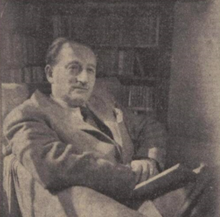Paul Tabori
Paul Tabori | |
|---|---|
 Tabori in 1961 | |
| Born | Pál Tábori 5 August 1908 Budapest, Hungary |
| Died | 9 November 1974 (aged 66) London, England |
| Other names | Paul Hefner, Peter Stafford, Christopher Stevens, Paul Tabor (see the footer) |
| Occupation | Author, novelist, journalist, psychical researcher |
Paul Tabori (born Pál Tábori; 5 August 1908 – 9 November 1974) was a Hungarian-Jewish[1] author, novelist, journalist and psychical researcher. He also wrote under the name Peter Stafford.[2][3] He was the brother of writer and theatre director George Tabori.
Early life[]
Tabori was born on 5 August 1908, in Budapest, Hungary. His father Kornél (Cornelius) died in Auschwitz in 1944, but with his mother he managed to escape the Nazis, fleeing Budapest.[4] Tabori moved to London in 1938 and made his home at Stafford Terrace in Kensington.[5]
He obtained a Ph.D. from Kaiser Friedrich Wilhelm University and graduated as a Doctor of Economic and Political Science at Pazmany Peter University.[6] He later worked as a journalist in Hungary and London.
Psychical research[]
In The Art of Folly (1961), Tabori included a chapter that documented the fraud of various spiritualist mediums. Stephen Potter in a review wrote the book "gives us one of the best brief accounts I have ever read of the scientific examination of the claims of spiritualists, and the delusions of such great men as Oliver Lodge and Conan Doyle".[7]
Tabori and Peter Underwood in their book Ghosts of Borley (1973) wrote they believed "some of the phenomena were genuine" at the Borley Rectory.[8] The researcher Trevor H. Hall criticized Tabori and Underwood for selective reporting. According to Hall the alleged paranormal phenomena from the rectory were the result of natural causes such as various creaks heard from the movement of rats or the flying of bats in the house; also, pranks such a local village boys throwing stones at the house or tramps trying to keep warm by lighting small fires in the rectory.[8]
Piet Hein Hoebens with Marcello Truzzi evaluated some psychic detective cases in prewar Germany that were featured in Tabori's Crime and the Occult (1974), concluding the cases had been misreported.[9]
Other activities[]
Tabori was the vice-president of The Ghost Club for a number of years until his death.[10] Tabori was the literary executor for the estate of British psychic researcher Harry Price and he wrote a biography of Price.[11]
He died on 9 November 1974 at the age of 66.[11]
Publications[]
Fiction
- They Came to London (1943)
- The Lion and the Vulture (1944)
- Private Gallery (1944)
- Solo (1948)
- Uneasy Giant (1949)
- Heritage of Mercy (1949)
- The Talking Tree (1950)
- The Frontier (1950)
- The Green Rain (1961)
- The Survivors (1964)
- The Doomsday Brain (1967)
- The Invisible Eye (1967)
- The Torture Machine (1969)
- The Cleft (1969)
- The Demons of Sandorra (1970)
- Lily Dale (1972)
- The Wild White Witch (1973)
Non-fiction
- Epitaph for Europe (1943)
- Harry Price: The Biography of a Ghost Hunter (1950)
- Alexander Korda (1959)
- The Natural Science of Stupidity (1959); reissued 1993 as The Natural History of Stupidity (1993)
- The Art of Folly (1961)
- The Book of the Hand (1962)
- Companions of the Unseen (1968)
- Dress and Undress (1969)
- Anatomy of Exile: A Semantic and Historic Study (1971)
- Erotic Edwardian Fairy Tales (1970)
- Beyond the Senses: A Report on Psychical Research in the Sixties (1971)
- Erotic Victorian Fairy Tales (1971)
- Secret and Forbidden (1971)
- Social History of Rape (1971)
- Pioneers of the Unseen (1972)
- Ghosts of Borley: Annals of the Haunted Rectory (1973), by Tabori and Peter Underwood
- Crime and the Occult: A Forensic Study (1974)
References[]
- ^ William D. Rubinstein, Michael Jolles, Hilary L. Rubinstein, The Palgrave Dictionary of Anglo-Jewish History, Palgrave Macmillan (2011), p. 976
- ^ Joseph F. Clarke (1977). Pseudonyms. BCA. p. 153.
- ^ http://www.sf-encyclopedia.com/entry/tabori_paul
- ^ Feinberg, Anat (1999). Embodied Memory: The Theatre of George Tabori. Iowa City: University of Iowa Press. pp. 4. ISBN 9780877456865.
- ^ McLellan, Alec (2004). The Secret of the Spear: The Mystery of the Spear of Longinus. London: Souvenir Press. p. 103. ISBN 0285636960.
- ^ "Paul Tabori - Senate House Library, University of London". Retrieved 27 October 2014.
- ^ Potter, Stephen. (1961). Frailties of Humankind. Review of The Art of Folly, by Paul Tabori. The Saturday Review, 22 July. p. 27
- ^ Jump up to: a b Hall, Trevor H. (1985). A Note on Borley Rectory: The Most Haunted House in England. In Paul Kurtz. A Skeptic's Handbook of Parapsychology. Prometheus Books. pp. 327-338. ISBN 0-87975-300-5
- ^ Hoebens, Piet Hein; Truzzi, Marcello. (1985). Reflections on Psychic Sleuths. In Paul Kurtz. A Skeptic's Handbook of Parapsychology. Prometheus Books. pp. 631-643. ISBN 0-87975-300-5
- ^ Underwood, Peter. (1983). No Common Task: The Autobiography of a Ghost-Hunter. Harrap. p. 154
- ^ Jump up to: a b "Paul Tabori (1908-1974)". (2001). Encyclopedia of Occultism and Parapsychology. Retrieved 27 October 2014.
External links[]
- Paul Tabori at Library of Congress Authorities, with 49 catalogue records under that name – and as Paul Hefner (no catalogue records), Peter Stafford (1), Christopher Stevens (1), and Paul Tabor (5)
- Hefner, Stafford, Stevens, and Tabor at WorldCat
- 1908 births
- 1974 deaths
- Hungarian Jews
- Hungarian journalists
- Hungarian male novelists
- Parapsychologists
- 20th-century Hungarian novelists
- Hungarian emigrants to England
- Hungarian–English translators
- 20th-century Hungarian male writers
- 20th-century journalists
- 20th-century translators